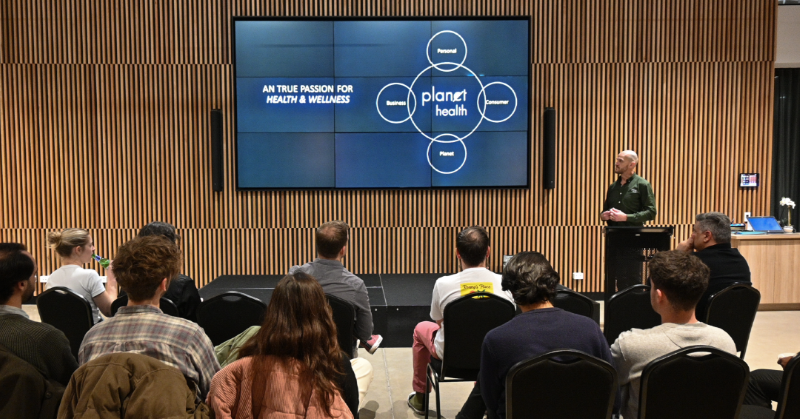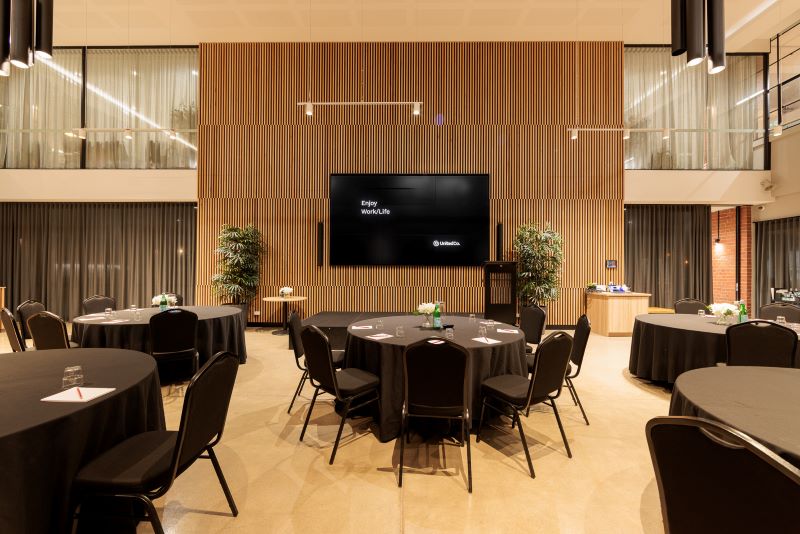
Corporate events offer a unique opportunity to drive business growth through networking and strategic engagement. Planning a successful conference, seminar, or product launch requires careful consideration and meticulous attention to detail. Here’s a United Co. comprehensive guide to help you plan and execute a corporate event that aligns with your business goals and objectives.
How to Plan a Corporate Event

If executed properly, utilizing events as networking opportunities to drive business growth can be an effective strategy. Here are key steps and strategies to leverage events for business growth, and how you can expand your business through successful events.
1. Define Clear Objectives
Determining your specific business objectives is essential before planning any event, including a corporate event. These could include increasing brand awareness, generating leads, driving sales, fostering customer loyalty, launching new products, or networking with potential partners. Understanding your goals will help you tailor the event to meet those needs.
2. Know Your Target Audience
Before your event, identifying your target audience is necessary. This will influence the event format, content, and promotion. Understanding your audience’s interests, pain points, and preferences will enable you to create a more engaging and relevant experience.
3. Choose the Right Corporate Event Type
Depending on your objectives and target audience, business leaders can host various types of events, such as conferences, trade shows, workshops, webinars, product launches, or networking events. Select the type that aligns best with your goals, and that will help drive business growth through the event.
4. Content the Corporate Event with Technology
Content is the heart of any successful event. Develop informative, entertaining, and valuable content that resonates with your audience. This could include keynote speeches, panel discussions, interactive workshops, live demonstrations, or presentations. Embrace technology to enhance the event experience and reach a broader audience, which can grow your business. Moreover, consider live streaming the event for virtual attendees. Also, you can use event apps for engagement, and leverage social media for real-time updates and interaction.
5. Collaborate with Partners
Partner with relevant organizations, companies, or industry influencers, professionals, entrepreneurs, or industry experts to co-host or promote your corporate event. Moreso, their endorsement can significantly increase your event’s reach and credibility.
6. Collect Data and Feedback
Use registration data and post-event surveys to collect valuable insights and knowledge about your conference attendees and their preferences. Additionally, analyze the data to improve future conference events and understand their impact on business growth.
7. Follow Up and Nurture Leads
After the launch event, engage with attendees through follow-up emails, personalized messages, or phone calls. Nurture leads and build lasting relationships with potential customers or partners.
8. Measure the Success of Your Corporate Event
Evaluate the launch event’s success based on your predefined objectives. Look at metrics like attendance, lead generation, sales, customer feedback, and return on investment (ROI). Use this data to refine your approach for future events.
By strategically planning and executing events with the above considerations in mind, for example, you can gain business growth through increased sales, brand visibility, customer engagement, and lead generation.
Read More About 5 Event Planning Trends for 2024
Benefit of Corporate Events for Your Business Growth

Corporate events offer a myriad of benefits for business growth. Let’s delve into how an event can improve your business growth.
1. Leverage Your Brand Awareness
Corporate events provide a platform to showcase your brand, products, and services to a targeted audience. By organizing or participating in events, you can reach a broader audience and increase brand visibility.
2. Lead Generation & Networking
Events are an excellent opportunity to capture leads. Attendees who show interest in your offerings are potential customers. You can collect contact information and follow up with them after the event to nurture those leads.
3. Customer Engagement and Loyalty
Face-to-face interactions at events create a deeper and more personal connection with customers. Also, engaging with your audience directly can foster loyalty and strengthen your network and customer service relationships.
4. Product Launches and Demonstrations
Events provide companies with a perfect stage to launch new products or services. You can demonstrate their features, benefits, advantages, and benefits to an interested and engaged audience, which helps drive business growth through events.
5. Market Research and Feedback
Corporate events offer an opportunity to gather valuable feedback from customers and prospects. You can gain insights into their preferences, pain points, and expectations, which can guide your future business decisions.
6. Thought Leadership
Hosting or participating in events, seminars, and conferences allows you to showcase your position and present yourself as a thought leader in your industry. Also, sharing valuable insights and expertise through presentations or panel discussions can establish your authority and credibility.
7. Improved Customer Retention & Enhanced Employee Morale
Events can be used as a networking opportunity to show appreciation to existing customers, fostering a sense of loyalty and encouraging repeat business.
8. Media Coverage and Public Relations
Successful business events often attract media attention, leading to potential press coverage and positive public relations for business events and your brand.
9. Enhanced Employee Morale
Involving and training your employees in event planning and participation can boost their morale and sense of ownership in the company or team’s growth.
10. Data and Analytics
Events provide an opportunity to collect valuable data and analytics, helping you measure the success of your strategies and make informed decisions for future business growth events and initiatives.
By integrating events into your business growth strategy, you can create meaningful connections with your target audience, build brand authority, and generate new business opportunities that contribute to long-term success.
Read More About 9 Tips To Organise A Successful Networking Event
A Strategic Business Growth Strategy with Events
A strategic business growth strategy with corporate events requires a meticulous approach that aligns event planning with broader business objectives. To begin, it’s essential to define clear growth goals and understand how events can contribute to their realization. Whether it’s increasing brand awareness, expanding market share, or launching new products, events serve as powerful platforms to drive these ambitions.
Furthermore, Targeting the right audience is of course crucial for maximizing the impact and return on investment (ROI) of events. By identifying and focusing on the needs of a niche audience, businesses can tailor event experiences to resonate deeply with attendees. Additionally, personalization plays a key role in capturing the interest and loyalty of potential customers, enhancing the chances of converting event engagement into tangible business results.
Moreover, creating compelling event experiences is equally vital in ensuring the success of the strategy. Furthermore, event design should revolve around the idea of delivering memorable and immersive experiences that leave lasting impressions on participants. From thought-provoking keynotes to interactive workshops and engaging networking sessions, the right mix of content and activities can make a significant difference.
However, it is not enough to merely host successful events; businesses must also measure their impact on business growth. Identifying key metrics that gauge the success of events is essential for quantifying their contribution to the overall growth strategy. Analyzing data and insights collected during and after events allows for continuous improvement, enabling organizations to refine their approach and optimize future events for even greater impact.
In summary, a well-crafted strategic business growth strategy with events should be an ongoing process, continually adapting to changing market dynamics and evolving business objectives. Furthermore, by integrating events into their growth roadmap, businesses can gain a competitive advantage, create valuable connections with customers, expand, and achieve sustainable success in their industries.
How to Find Your Ideal Event Space

Finding the ideal event space is crucial for hosting a successful and memorable event. Here is the United Co.’s guide to help you find the perfect corporate event venue:
1. Event Requirements
Start by clearly defining your event’s needs and requirements. Consider factors such as the type of event, the number of attendees, the event’s theme, budget constraints, location preferences, and any specific amenities or facilities you may require.
2. Company Budget
Determine your budget for the venue. This will help you narrow your options and ensure you choose a space that aligns with your financial resources.
3. Event Location
The venue’s location plays a significant role in the event’s success. Moreso, you can consider logistical factors like if the venue is easily accessible for your target audience and has adequate transportation options nearby. Additionally, consider proximity to airports, hotels, and public transportation.
4. Capacity and Space Layout
Ensure the venue can comfortably accommodate the number of attendees you expect. Additionally, assess the space layout and its suitability for your event format, such as theater-style seating, back room, banquet setup, boardroom setup, or networking areas.
5. Amenities and Facilities
Check what amenities and facilities the venue offers, such as audiovisual equipment, Wi-Fi access, catering services, parking availability, and accessibility for all guests.
6. Ambiance and Style
Consider the ambiance and style of the next conference venue, ensuring it aligns with the tone and theme of your event. Whether you need a formal corporate setting, a modern space, or a more relaxed atmosphere, finding the right ambiance is crucial.
7. Recommendations
Research online reviews and testimonials from previous clients who have used the venue. Also, you can seek recommendations from peers, clients, or industry professionals who may have experience with event spaces in the area.
8. Tour the Event Space
Schedule site visits to the event venue. Seeing the space in person allows you to evaluate its condition, size range, and overall suitability for your event. Additionally, it also allows you to meet with venue staff and discuss any specific requirements needed for your event there.
9. Flexibility and Customization
Check if the venue is flexible in accommodating your event’s unique needs. Furthermore, some venues may have restrictions on decoration, catering, or event hours. So ensure they can meet your specific requirements.
10. Contract and Policies
Review the venue’s contract thoroughly, paying attention to details like rental fees, cancellation policies, insurance requirements, and any additional charges. It is important to seek clarification on any ambiguous clauses before signing the agreement.
11. Consider Local Regulations
Be aware of local regulations and permits required for hosting events in the area. Furthermore, ensure the venue is compliant with all necessary permits and safety standards.
By diligently following these steps, you can identify the ideal event space that meets your event’s requirements and contributes to a successful and enjoyable experience for you and your attendees.
Read More About 17 Ideas To Attract More People To Your Corporate Events
Corporate Events at United Co.
United Co. offers an exceptional event space for hosting successful and memorable gatherings. With its prime location, flexible spaces, and state-of-the-art amenities, United Co. is the ideal choice for a wide range of corporate events. Host corporate conferences and workshops networking sessions, seminars, and new product launches. Book a tour at United Co. today if you are hosting an upcoming event!




